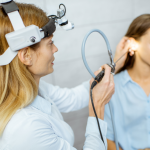Read Time:3 Minute, 58 Second
- What are anal injuries?
- It can be distressing when there are injuries to the anus, which can be caused by changes in bowel function or sexual activity. There are ways to manage and prevent anal injuries.
- What causes anal injuries?
- The anus is made up of the last few centimetres of the bowel (anal canal) and the anal opening, through which stool (poo or faeces) leave your body.
- Injuries to the anal region are often caused by changes in bowel function such as diarrhoea or constipation. These can cause pain and irritation, damage the skin around the anus and sometimes lead to bright red blood spotting on toilet paper or in the toilet bowl.
- Sometimes the muscles in and around the anal region go into spasm, and this can lead to a tightening of the sphincter that makes passing stool painful. It can also cause a tear, called an anal fissure, which can bleed.
- Anal injuries can also be caused by sexual activity involving insertion of objects, fingers or a penis through the anus and into the rectum. Friction, sharp edges or rough behaviour can tear the sensitive skin and lining of the rectum, causing pain, inflammation and bleeding.
- When should I see my doctor?
- You should call triple zero (000) and ask for an ambulance if you have an anal injury and you:
- start to bleed heavily
- are unable to move
- feel faint or as if you might pass out
- If an object, such as a sex toy, is lodged in the rectum, it needs to be removed urgently by a doctor. Go to the nearest emergency department (ED).
- You must not try to remove the foreign body by yourself or allow anybody else to try — trying to remove it may cause more damage if it is done by someone who is not medically trained.
- It is vital that the object is not left inside because it can damage the lining of the rectum and other internal organs or lead to serious, potentially life-threatening problems.
- How are anal injuries treated?
- Some anal injuries, such as those caused by anal fissures and haemorrhoids, will improve with good self-care, such as eating a high-fibre diet, drinking lots of water and careful anal hygiene.
- But if you have severe pain, the pain doesn’t improve in a few days, or you bleed from your bottom, it is important to seek medical advice.
- Treatment will depend on what has caused the anal injury.
- Anal fissures: options include laxatives to soften your stool (poo) and surgery.
- Haemorrhoids: options include having a high-fibre diet, drinking more water and avoiding straining when doing a poo. Surgery may be needed to remove severe haemorrhoids.
- Foreign bodies: any object in the rectum or anus should be removed to prevent serious complications. The method used to remove the object will depend on the location of the object. An object close to the anus may be able to be removed in the emergency department. If the object is far into the rectum, an operation under general anaesthetic may be needed.
- Self-care of anal injuries
- If the anal area is extremely painful and swollen, a cold compress or covered ice pack, such as a bag of frozen peas wrapped in a clean towel, may be used to relieve the pain and swelling. Don’t keep the ice pack on the area for more than 30 minutes.
- Protect the area while seeking medical attention so that you don’t cause any further damage to the surrounding areas.
- If you are in pain, get advice on pain relief medicines you can take.
- If you have any pain or bleeding from the anal area, stop anal sex and don’t have sex again until you have seen a doctor. If you have anal sex when your skin is broken or damaged, you are at increased risk of HIV or sexually transmitted infections (STIs). It can also lead to further damage of the area.
- Suspicion of deliberate injury
- If there is any suspicion that the injury was not the result of an accident and that it was deliberately inflicted, you should seek help from a healthcare professional as soon as possible. This could be a nurse or doctor at an emergency department or a doctor’s surgery, or a health visitor or school nurse.
- You can also search for local services and agencies that can offer confidential advice in the National Health Services Directory.
- Can anal injuries be prevented?
- Good anal hygiene, drinking plenty of water and eating fibre-rich foods may prevent conditions that can injure the anus.
- To prevent injuries during sex, use a sex toy or vibrator designed to be inserted into the rectum. These have a flange to prevent them from going in too far.


